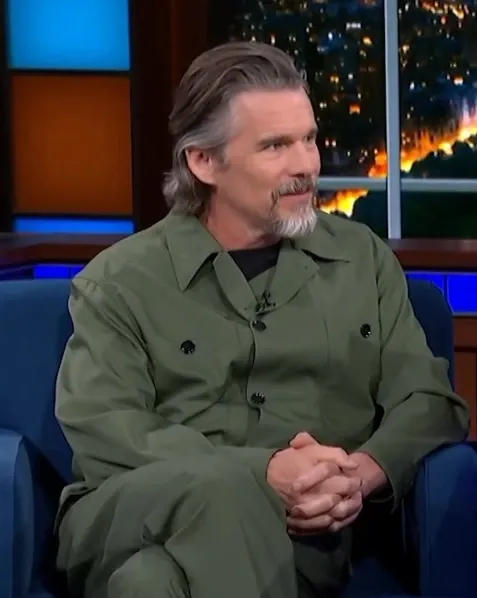Is Falling in Love on Set Really 'Dangerous'?

Synopsis
Key Takeaways
- Falling in love on set can lead to emotional complications.
- Imaginative intimacy amplifies feelings.
- Media attention can be overwhelming for celebrities.
- Fame alters perceptions of normal interactions.
- Real-life connections are vital for sustaining relationships.
Los Angeles, Sep 2 (NationPress) Hollywood actor Ethan Hawke, who met his first spouse Uma Thurman while filming Gattaca in 1997, has shared his thoughts on the potential risks of developing romantic feelings on a film set. He believes it poses a certain danger since it lacks any ties to the daily realities of life.
The 54-year-old star, whose marriage to Uma ended in 2003, elaborated on how the imaginative intimacy actors experience during projects can amplify their emotions, even if it feels disconnected from the real world.
In an interview with GQ Hype, Hawke remarked, “Have you ever played Spin the Bottle? There’s a unique intimacy in our work. It’s an imaginative intimacy. It creates a rush that feels both thrilling and perilous.”
“It elevates the temperature of your life. It’s reminiscent of falling in love at summer camp, completely detached from the norms of everyday life. That’s where the danger lies.”
The Blue Moon actor expressed discomfort over the media attention surrounding his relationship with Uma, as reported by femalefirst.co.uk.
He noted, “It’s quite humiliating. Even positive remarks can feel awkward.”
During that period, Hawke auditioned for the role of Jack Dawson in Titanic, and he now feels relieved not to have landed the part.
He stated, “I doubt I could have coped with that level of fame as well as Leonardo DiCaprio. He was like a Beatle.”
Despite this, Hawke has become accustomed to the attention that comes with his fame, often questioning the behavior of some individuals, which his wife argues is just them being normal.
He shared, “My wife has a great sense of humor. We might be out dining, and I’ll say, ‘That waiter was rude.’ She replies, ‘They weren’t rude; they just didn’t recognize you. They were behaving normally. You’ve grown used to everyone being friendly or accommodating.’
“The issue with this kind of attention is that anything below a certain level feels cold. When you get tickets for a game and find yourself sitting ten rows back instead of at the front, it feels like a letdown.”








